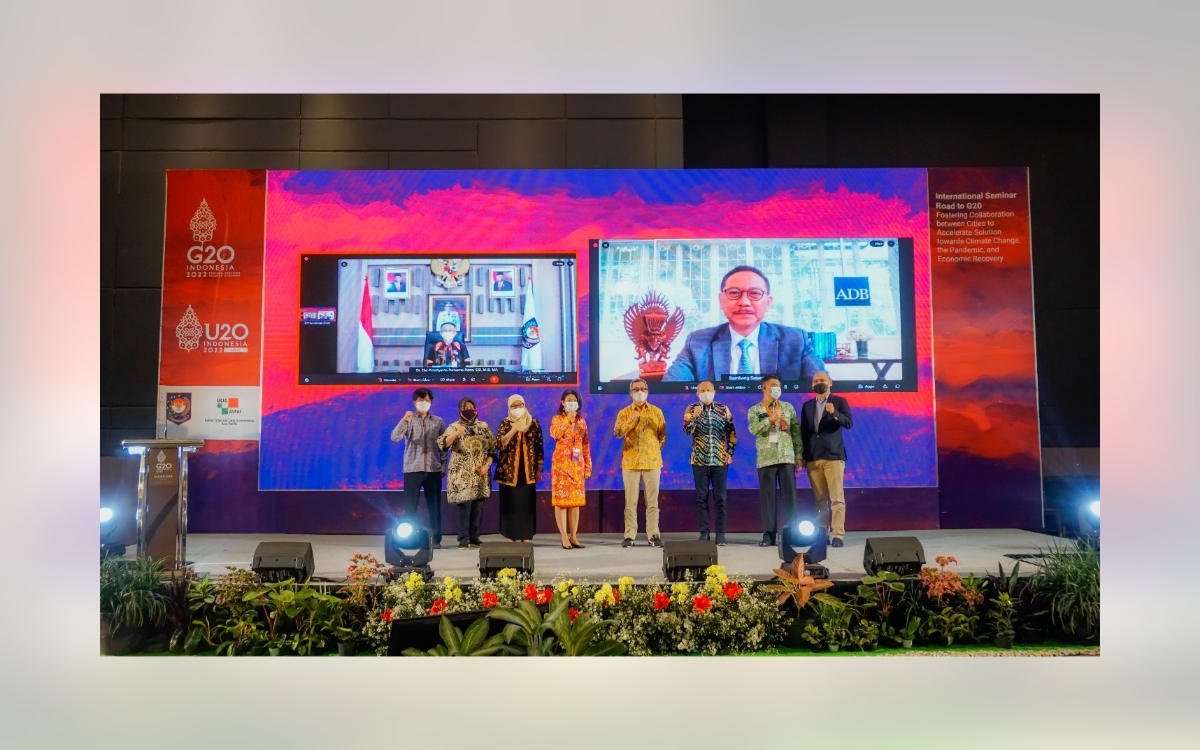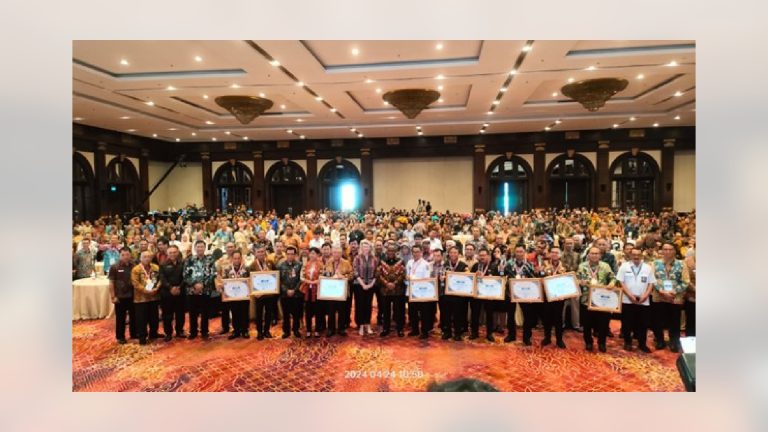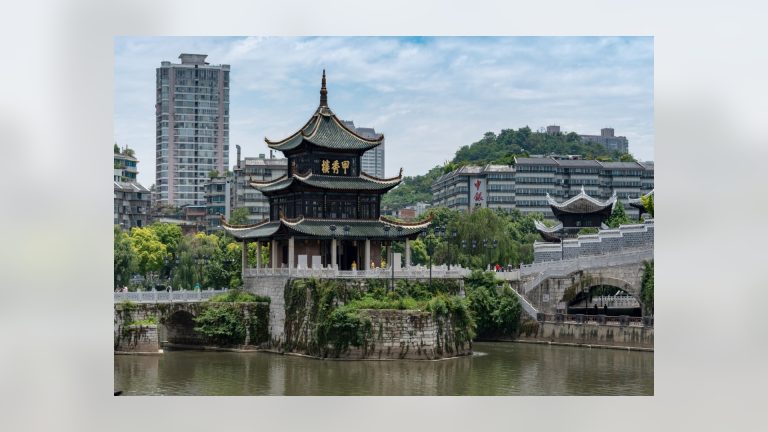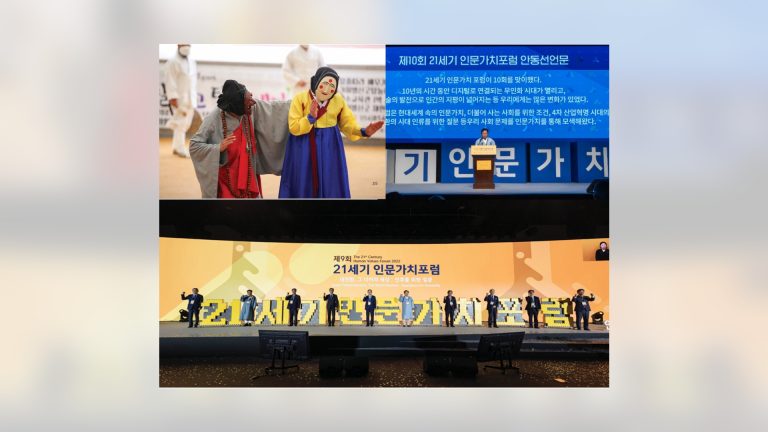[et_pb_section fb_built=”1″ admin_label=”section” _builder_version=”3.22″][et_pb_row admin_label=”row” _builder_version=”3.25″ background_size=”initial” background_position=”top_left” background_repeat=”repeat” custom_padding=”||11px|||”][et_pb_column type=”4_4″ _builder_version=”3.25″ custom_padding=”|||” custom_padding__hover=”|||”][et_pb_text admin_label=”Text” _builder_version=”4.9.2″ background_size=”initial” background_position=”top_left” background_repeat=”repeat” hover_enabled=”0″ sticky_enabled=”0″]
24 February 2022 | UCLG ASPAC jointly with the Ministry of Home Affairs (MoHA) of Indonesia held an International Seminar Road to Indonesia’s G20 Presidency under the theme “Fostering Collaboration between Cities to Accelerate Solution towards Climate Change, the Pandemic, and Economic Recovery.” Organised on a hybrid mode in Bandung, West Java, this event aimed at showcasing the exemplary and good practices and the success of cities and local governments in achieving areas in accordance with the U20 priority issues; thus, contributing to the upcoming G20 event in November “Recovering Together, Recovering Stronger”.
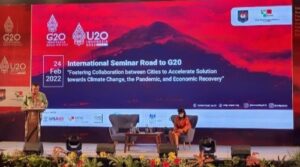
[/et_pb_text][/et_pb_column][/et_pb_row][et_pb_row _builder_version=”4.9.2″ _module_preset=”default” custom_padding=”10px||10px|||”][et_pb_column type=”4_4″ _builder_version=”4.9.2″ _module_preset=”default”][et_pb_text _builder_version=”4.9.2″ _module_preset=”default” hover_enabled=”0″ sticky_enabled=”0″]
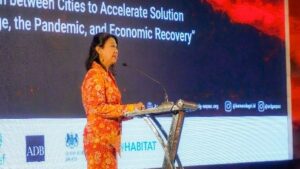
Inclusivity must also be reflected in economic policies as highlighted by Dr. Eko Prasentyo Purnomo Putro, representing the Secretary General of Ministry of MoHA, which can be strengthened by cities. “Collaboration is important and not to be missed as U20 focuses on green and equitable recovery in cities,” he said.
[/et_pb_text][/et_pb_column][/et_pb_row][et_pb_row _builder_version=”4.9.2″ _module_preset=”default” custom_padding=”10px||10px|||” locked=”off”][et_pb_column type=”4_4″ _builder_version=”4.9.2″ _module_preset=”default”][et_pb_text _builder_version=”4.9.2″ _module_preset=”default” hover_enabled=”0″ sticky_enabled=”0″]
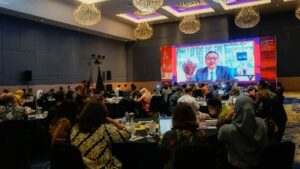
To tackle those issues, Mr. Bambang continued how ADB has created the 5E Approach to create liveable cities which are: 1) Economic Competitiveness 2) Environmental Sustainability and Resilience 3) Equity and Inclusiveness 4) Enablers and 5) Engagement.
Upon those messages, Mr. Ali Moechtar, Social Policy Specialist (UNICEF Indonesia) took the floor in moderating the first session; focusing on four speakers to introduce the G20 Presidency of Indonesia and what it means for Indonesian cities and others.
In this session, representatives from U20 Co-chairs from DKI Jakarta Provincial Government (Mrs. Sri Hayati) and West Java Provincial Government (Mr. Setiawan Wangsaatmaja) highlighted respective issues and initiatives. For West Java, it is about improving the regional creative economy development with over 1.5 million registered creative economy businesses, waste management, as well as information and communication services. Meanwhile in Jakarta, the spirit of collaboration is continued to be reflected in the Jakarta Development Collaboration Network (JDCN).
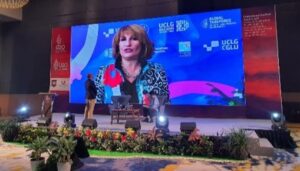
The session also involved speakers from local governments network, such as Ms. Millag San Jose-Ballesteros as Global South Diversity Lead of C40 Cities – a network of Mayors collaborating to confront the climate crisis. In terms of recovery, it is now the most strategic time for cities to focus on green climate action. “Climate action is rooted in equity and a green and just future for all as tackling climate change is not independent of socio-economic impacts,” she said.
[/et_pb_text][/et_pb_column][/et_pb_row][et_pb_row _builder_version=”4.9.2″ _module_preset=”default” custom_padding=”10px||10px|||” locked=”off”][et_pb_column type=”4_4″ _builder_version=”4.9.2″ _module_preset=”default”][et_pb_text _builder_version=”4.9.2″ _module_preset=”default”]
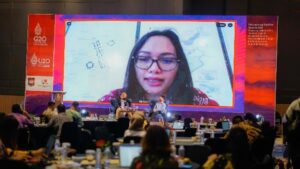
To conclude the session, Mr. Hung Vo, Environment Officer of USAID Indonesia reminded participants to always go back to the potential of cities and local governments as strategic collaborators to tackle important issues like climate change. “Cities are built to collaborate and in recent decades, cities have positioned themselves as centre of growth. Why collaborate? Climate change is a transboundary phenomenon, and collaboration can help cities enhance their combined position in the global economy as well as resolve mutual concerns,” he said.
Therefore, the last session of the International Seminar Road to G20 facilitated by Mr. Bruno Dercon of UN-Habitat showcased exemplary practices of Asia-Pacific cities in paving the way for a just and resilient future. It could be seen that there are major signs of progress in digital transformation, energy transition, climate action and even pandemic prevention. Jambi Mayor in his presentation mainly focused on energy transition with optimisation of waste management systems, is now generating several waste-oriented regulations and policies. Similar initiatives were also found in Mumbai city, represented by Municipal Commissioner, with the city’s aim to shift transportation preferences from private to public such as with the Urban Transportation Project.
Mayor of Makassar and a representative of Xi’an in their presentations focused on digitalisation and growth such as homecare telemedicine services, surveying and mapping systems, improving administrative efficiency, as part of providing better public services. Meanwhile, Surakarta Mayor and Semarang Vice Mayor have been placing priority in creating healthy and inclusive environment such as free, high quality government services such access to healthcare and protecting disability rights and many more. Finally, Seoul City government’s take on a smart safe city is one that utilises technology to enhance safety of its citizens by rapid gathering of data to predict upcoming disasters and COVID-19 response in Guangzhou city is similar in its approach with maximising technology for early detection of surging cases, reporting, timely isolation as well as treatment.
This event concluded with several recommendations to be proposed to the upcoming G20 event in November, including:
- G20 Presidency of Indonesia is important to increase engagement of cities of G20, accommodate cities and local governments in facing global issues, such as climate change and COVID-19 pandemic.
- Cities are the frontliners in promoting sustainable development and supporting resilient recovery from humanitarian crisis caused by COVID-19. Local actions will determine the success of national and international policy. Thus, U20 is an important forum to synchronise national priority and global commitment and to bring perspectives of cities into the priority agenda of G20.
- Extreme poverty is oftentimes centred in urban areas; and government, both central and local, are thriving to accommodate population increase. Creating safe and sustainable city means ensuring access to safe and affordable housings, investment on public transport, creating green space for public, improvement of planning and inclusive management of urban areas, and involvement of various stakeholders.
- Collaboration of various stakeholders is imperative. Role of society, particularly youth in urban areas, are essential in encouraging innovations to promote sustainable development, tackle COVID-19 challenge, and recover the economy.
- Collaboration requires dedication and commitment from all parties.
- MoHA will provide guidelines and supervision for local governments to ensure the effective and efficient administration.
Through this International Seminar, UCLG ASPAC hopes that more and more cities will get inspired through the showcase of innovative solutions, open the space of collaboration even wider, and thus accelerate the recovery at the local level which eventually contributes to the national level.
UCLG ASPAC thanks Ministry of Home Affairs of Indonesia for the great collaboration and all speakers and facilitators for good sharing. We are looking forward to continuing the support in the future.
[/et_pb_text][/et_pb_column][/et_pb_row][/et_pb_section]








